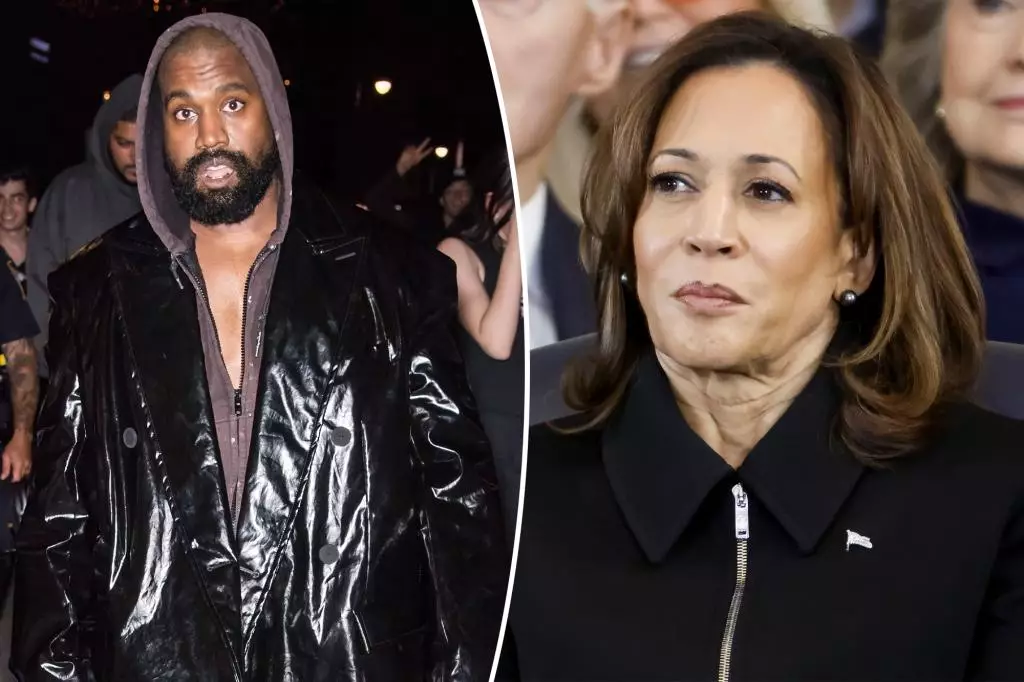Kanye West, often at the center of public scrutiny and conversation, recently sparked significant media attention with a perplexing series of comments directed toward former Vice President Kamala Harris. The rapper’s impulsive remarks elucidate a larger narrative surrounding celebrity culture and its intersection with politics. This analysis seeks to unpack the implications of his statements, delve into the context behind the rhetoric, and explore the wider ramifications for both West and the political figures involved.
West’s original comment — a crude assertion expressing his disinterest in pursuing Harris due to her political loss — quickly became a focal point for discussions surrounding misogyny and respect in political dialogue. The tweet, which he later deleted, reading, “I used to want to f–k Kamala until she lost. I don’t f–k losers anymore,” raises troubling questions about the societal norms that tolerate such objectification of powerful women. Not only does this illustrate a concerning attitude toward female politicians, but it also reflects a larger trend in how success and failure are intertwined with personal worth and appeal.
Following the outrage that ensued, West attempted to downplay his remarks with a follow-up tweet that seemed to mock both political parties, stating, “Naw I’m kidding. Dey don’t control black people no more. Trump 4 life.” Such statements, while intended to be humorous, reveal a depth of insensitivity and complicity in perpetuating divisive narratives that do little to foster actual dialogue or change. Instead, West’s antics suggest that celebrity status can often drown out respectful discourse, transforming serious political figures into fodder for entertainment.
The Relationship Dynamics and Personal Context
Furthermore, the personal circumstances surrounding West and Harris add another layer to the narrative. While West is currently married to Bianca Censori, Harris maintains her marriage with Douglas Emhoff. The interplay between their personal lives and professional personas raises questions about the boundaries of respect in public discussions. It’s crucial to consider how personal feelings and past relationships can affect how public figures navigate their communications.
The frequency with which West finds himself embroiled in controversial discussions can obscure the severity of the issues he touches upon. His history of public outbursts and socially charged comments, once marked as revolutionary, has now often teetered toward the farcical. The rapper’s previous bans from platforms like X for anti-Semitic posts only add to a growing perception of him as someone who may not be taking seriously the weight of language in the political arena.
One cannot ignore the long-standing feud between West and fellow artist Taylor Swift when dissecting West’s recent behavior. His infamous interruption of her acceptance speech at the 2009 MTV Video Music Awards encapsulated a problematic dynamic that has transcended their careers, intertwining celebrity culture with notions of respect and recognition. By calling into question the legitimacy of Swift’s success, West became a symbol of the disruptive, yet often toxic, melodrama that envelops celebrity narratives.
With the impending 2025 Grammy Awards on the horizon, where both artists will find their work recognized, one wonders if these past grievances will resurface. West’s casual jabs and the subsequent backlash may detract from his potential artistic achievements, overshadowing the merit of his music with a cloud of controversy instead.
The Implications of Celebrity Statements
Ultimately, Kanye West’s comments toward Kamala Harris open a broader discourse on the implications of celebrity voices in political arenas. As influential figures, they wield substantial power in shaping public opinion. Yet, when that power is used to spread divisive rhetoric or indulge in objectification, it diminishes the potential for meaningful engagement with pressing societal issues.
In a world increasingly characterized by the blurring of lines between entertainment and politics, West’s provocative statements deservedly invite scrutiny. They challenge us to reflect on how we engage with public figures and the weight of their words; our responses can shape the cultural landscape for the better — or for the worse. As such, we must grapple with the responsibility that comes with platform and influence, especially in our interconnected age where statements reverberate far beyond their initial intention.

